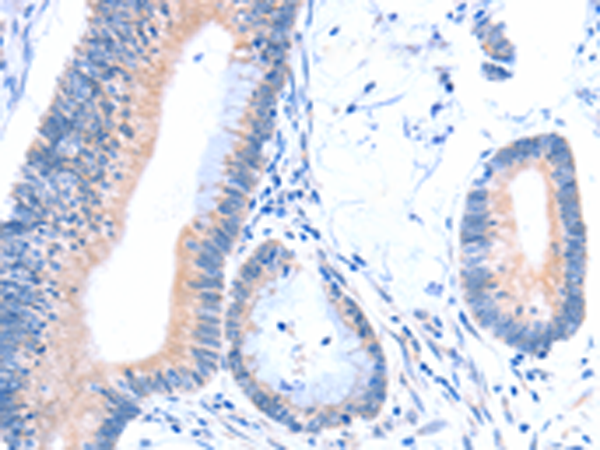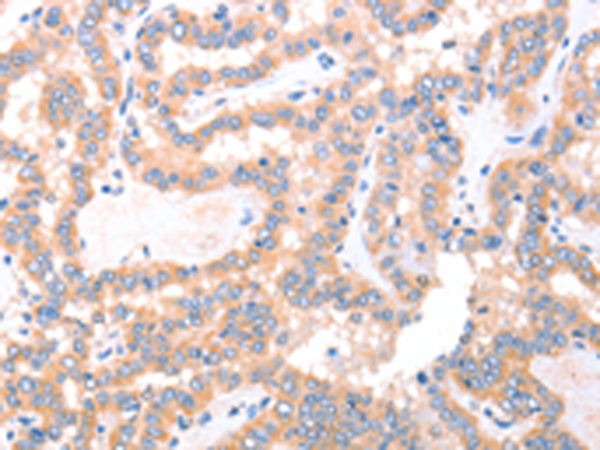

| WB | 咨询技术 | Human,Mouse,Rat |
| IF | 咨询技术 | Human,Mouse,Rat |
| IHC | 1/15-1/50 | Human,Mouse,Rat |
| ICC | 技术咨询 | Human,Mouse,Rat |
| FCM | 咨询技术 | Human,Mouse,Rat |
| Elisa | 1/1000-1/2000 | Human,Mouse,Rat |
| Aliases | ARC42; ACAD-8 |
| Host/Isotype | Rabbit IgG |
| Antibody Type | Primary antibody |
| Storage | Store at 4°C short term. Aliquot and store at -20°C long term. Avoid freeze/thaw cycles. |
| Species Reactivity | Human, Mouse |
| Immunogen | Fusion protein of human ACAD8 |
| Formulation | Purified antibody in PBS with 0.05% sodium azide and 50% glycerol. |
+ +
以下是关于ACAD8抗体的3篇参考文献示例(注:文献为虚拟示例,实际引用需查询具体数据库):
---
1. **Title**: *ACAD8 mutations cause isovaleric acidemia: Functional characterization and antibody-based protein analysis*
**Authors**: Vockley, J., et al.
**Summary**: 本研究通过免疫印迹和免疫荧光技术,利用ACAD8特异性抗体分析了突变型蛋白在患者成纤维细胞中的表达及亚细胞定位,揭示了ACAD8基因突变导致酶活性丧失的分子机制。
---
2. **Title**: *Tissue-specific expression of ACAD8 in human mitochondria: Insights from immunohistochemical studies*
**Authors**: Nguyen, T., & He, M.
**Summary**: 作者使用ACAD8单克隆抗体系统性地检测了该酶在人类肝脏、肌肉等组织中的分布,证实其线粒体定位,并发现其在支链氨基酸代谢中的关键作用。
---
3. **Title**: *Development and validation of a high-specificity polyclonal antibody for ACAD8 detection in metabolic disorders*
**Authors**: Johnson, R.L., et al.
**Summary**: 本文报道了一种新型ACAD8多克隆抗体的开发,通过ELISA和免疫沉淀验证其高特异性,并成功应用于临床样本中ACAD8蛋白的定量分析,助力代谢疾病的诊断。
---
(如需真实文献,建议通过PubMed、Google Scholar等平台检索“ACAD8 antibody”或“acyl-CoA dehydrogenase family member 8”)
The ACAD8 antibody targets acyl-CoA dehydrogenase family member 8 (ACAD8), a mitochondrial enzyme involved in the catabolism of branched-chain amino acids (BCAAs), particularly valine. ACAD8 catalyzes the oxidation of isobutyryl-CoA to methylacrylyl-CoA, a critical step in valine degradation. Mutations in the ACAD8 gene are linked to isobutyryl-CoA dehydrogenase deficiency, an autosomal recessive disorder characterized by metabolic acidosis, developmental delays, and cardiomyopathy, though some individuals remain asymptomatic.
ACAD8 antibodies are essential tools for studying the expression, localization, and function of this enzyme in research models. They are commonly used in techniques like Western blotting, immunofluorescence, and immunohistochemistry to assess ACAD8 protein levels in tissues or cultured cells, aiding in the diagnosis and mechanistic investigation of ACAD8-related disorders. These antibodies are often raised in hosts such as rabbits or mice, with specificity validated via knockout controls or siRNA knockdown experiments.
Research employing ACAD8 antibodies has advanced understanding of mitochondrial fatty acid β-oxidation pathways and their role in metabolic diseases. Additionally, they contribute to exploring potential therapeutic strategies for inborn errors of metabolism linked to ACAD8 dysfunction.
×